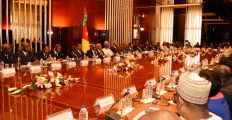25, February 2017
Guinea-Bissau: Hundreds of protesters demand departure of President Jose Mario 0
Hundreds of protesters have marched through the capital of Guinea-Bissau, demanding the departure of embattled President Jose Mario Vaz. On Thursday, the crowd of angry demonstrators on the main avenues of the capital Bissau held anti-government placards and repeatedly chanted slogans such as “Jomav get out”, using the president’s local nickname.
They also called for fresh elections to end the political crisis gripping the African country. The demonstration came a day after parliament rejected a program submitted by Prime Minister Umaro Mokhtar Sissoco Embalo.
Vaz appointed Sissoco in November after months of regional talks seeking an end to an 18-month political turmoil in the country. The prime minister has already missed a 60-day deadline to present a government program and budget that have to be accepted by parliament.
“The party … voted against the program of the PM because his government is illegitimate,” said Seidy Ba Sane, a spokesman for the country’s ruling PAIGC party. Sissoco has stressed that he would continue ruling without the confidence of parliament.
People in the West African country say the failure to pass a budget has begun to affect their daily lives and caused delays in payment of salaries for civil servants. In addition, the ongoing crisis has stoked fears that drug traffickers might profit from the power vacuum in the country. Earlier this month, the United Nations expressed concern “over challenges posed by transnational organized crime and emerging threats, including drug trafficking, in the country.”
The economy of Guinea Bissau, one of the world’s poorest countries, is heavily reliant on cashew nut production. Violence has rocked Guinea-Bissau since 1974 when it gained independence from Portugal. Since its independence, the country has suffered from political turmoil, including a series of military coups largely due to the unprecedented expansion of the army.
Presstv


























3, March 2017
Sudan’s Bashir appoints first premier since 1989 coup 0
Sudan’s President Omar al-Bashir has appointed a prime minister for the first time since the post was abolished following a coup in 1989. Bakri Hassan Saleh, 68, took the oath of office at the presidential palace in Khartoum on Thursday, a day after he was named as prime minister by the executive bureau of the president’s National Congress Party (NCP).
A close confidante of Bashir, Saleh has served in several ministerial portfolios in the Sudanese government, including interior and defense. The army general, who is known as “Bashir’s shadow,” was head of Sudan’s all powerful National Security and Intelligence Service in the 1990s.
Saleh was an influential military officer in the 1989 coup which brought Bashir to power. He has been a key aide to Bashir and served as first vice-president, a post he will continue to occupy in the future.
The appointment is part of reforms proposed by a year-long national dialogue between the Sudanese government and some opposition groups.
Bashir, who has faced criticism over his way of dealing with dissent, concluded in October last year a national dialogue involving his government and several opposition groups. The main aim of the initiative is to resolve insurgency in Sudan’s border regions and heal the country’s crisis-wracked economy.
Bashir scrapped the post of prime minister after he launched the 1989 coup against then premier Sadiq al-Mahdi. Lawmakers approved constitutional amendments last year while Mahdi returned to Sudan from a two-year exile last month. The post of prime minister was created by constitutional amendments.
Many say the appointment of a new prime minister would help Bashir revive his decades-old rule and give it a new look. Khaled Tigani, a senior journalist, said Sudan would hardly differ under Saleh’s premiership as it would be a continuation of Bashir’s rule.
“General Bakri’s appointment is broadly a continuation of Bashir’s rule rather than a new chapter in Sudan’s politics,” he told AFP, adding, “But at the end of the day it depends on the leadership that General Bakri manages to show.”
Saleh said in a brief statement after taking oath that his cabinet would represent various political forces. “Our country is at a historic moment as it harmonizes all political parties and powers who participated in the national dialogue,” Saleh said.
Presstv